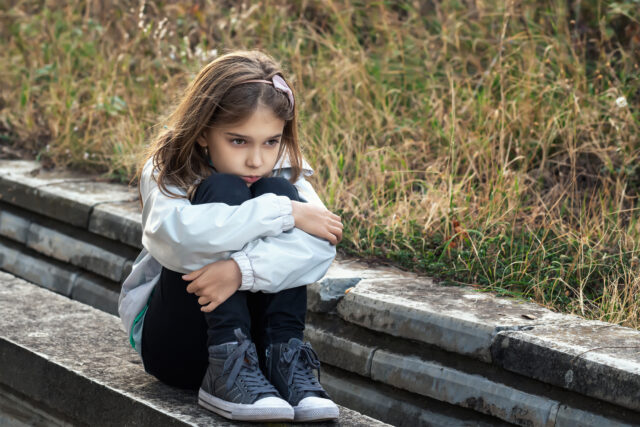A troubled childhood can leave lasting marks on our personalities, shaping the way we interact with the world and ourselves. While everyone’s experiences are unique, some personality quirks might hint at a difficult past. Here are a few to consider.
1. You have an intense fear of abandonment.

This fear can show up in clingy behaviour, constantly needing reassurance, or even sabotaging relationships out of fear they’ll inevitably end. It’s like a constant knot in your stomach, the worry that anyone you get close to will eventually leave. This often stems from experiencing loss or instability as a child.
2. You struggle to trust people.

Maybe you’ve been hurt or betrayed in the past, and now it’s hard to let your guard down. You might overanalyse people’s motives, question their intentions, or find it difficult to believe they genuinely care. This distrust can create a barrier to forming close relationships, leaving you feeling isolated and alone.
3. You have a hard time setting boundaries.

Saying “no” feels impossible, and you often go out of your way to please people, even if it means sacrificing your own needs. This can lead to feeling overwhelmed, resentful, and taken advantage of. It might be because you weren’t taught to value your own needs as a child, or because you were constantly expected to prioritise other people.
4. You’re a perfectionist.

Nothing is ever good enough, and you constantly strive for flawlessness. Mistakes feel like failures, and you hold yourself to impossibly high standards. This drive for perfection can be exhausting and lead to anxiety and burnout. It might be rooted in a childhood where you felt you had to be perfect to earn love and approval.
5. You have difficulty controlling your emotions.

Your moods swing like a pendulum, and you find yourself easily overwhelmed by anger, sadness, or anxiety. You might lash out, withdraw, or engage in self-destructive behaviours. This emotional instability can make it hard to maintain relationships and cope with everyday life. It could be a result of growing up in an environment where your emotions were invalidated or punished.
6. You seek external validation.

Your self-worth hinges on what other people think of you. You constantly seek approval, compliments, and reassurance. This need for external validation can lead you to make choices that aren’t in your best interest, just to make everyone else happy. It might stem from a childhood where your own feelings and opinions were dismissed or ignored.
7. You have low self-esteem.

You see yourself as flawed, unworthy, and unlovable. You constantly criticise yourself, focus on your shortcomings, and compare yourself unfavourably to other people. This negative self-image can affect every aspect of your life, from your relationships to your career. It often develops as a result of childhood experiences where you were belittled, neglected, or made to feel inadequate.
8. You are hyper-independent.

You learned early on that you couldn’t rely on anyone, so you became fiercely self-sufficient. You might avoid asking for help, even when you need it, and push people away when they get too close. This hyper-independence can mask a deep fear of vulnerability and a belief that you have to handle everything on your own. It often stems from a childhood where you had to take care of yourself or other people because the adults in your life were absent or unreliable.
9. You have difficulty relaxing and enjoying yourself.

Fun feels like a foreign concept, and you struggle to let go and have a good time. You might feel guilty for not being productive, or worry that something bad will happen if you’re not constantly on guard. This inability to relax can lead to chronic stress and exhaustion. It could be a result of growing up in a chaotic or unpredictable environment where you never felt safe enough to let your guard down.
10. You have a pessimistic outlook on life.

You expect the worst and see the world through a negative lens. You might find it difficult to believe that good things can happen, and you tend to focus on the potential problems and pitfalls. This pessimism can be a self-fulfilling prophecy, as it can make it harder to take risks, try new things, and form positive relationships. It might stem from a childhood where you experienced disappointment, loss, or trauma, leading you to believe that the world is a fundamentally dangerous or unhappy place.
11. You’re overly critical of yourself (and everyone else).

You hold yourself and those around you to impossibly high standards. You’re quick to point out flaws and shortcomings, and you find it difficult to accept imperfection. This critical nature can create tension in your relationships and make it hard to feel good about yourself or other people. It might be a result of growing up in an environment where you were constantly criticised or judged, leading you to internalise those negative messages.
12. You have a strong need for control.

You feel anxious and overwhelmed when things don’t go according to plan. You might micromanage people, try to control every aspect of your life, or resist change. This need for control can be exhausting for you and those around you, and it can prevent you from enjoying spontaneity and flexibility. It often stems from a childhood where you felt powerless and vulnerable, so you learned to control your environment as a way to feel safe.
13. You struggle with intimacy.

Getting close to people feels scary and overwhelming. You might pull away when someone tries to get to know you on a deeper level, or you might sabotage relationships out of fear of being hurt. This difficulty with intimacy can leave you feeling isolated and lonely, even when surrounded by people. It often stems from childhood experiences where you were betrayed, abandoned, or not given the emotional support you needed to develop healthy attachments.
14. You have a hard time expressing your emotions.

You might bottle up your feelings, avoid talking about them, or express them in unhealthy ways, such as through anger or self-harm. This difficulty with emotional expression can make it hard to connect with people and can lead to unresolved emotional pain. It could be a result of growing up in an environment where you were taught to suppress your emotions or where expressing them was met with punishment or dismissal.
15. You engage in self-destructive behaviours.

You might turn to substances, risky behaviours, or self-harm as a way to cope with emotional pain. These behaviours can provide temporary relief, but they ultimately worsen your problems and create a cycle of self-destruction. They often stem from a childhood where you didn’t learn healthy coping mechanisms, or where you experienced trauma that left you feeling numb or disconnected from yourself.




